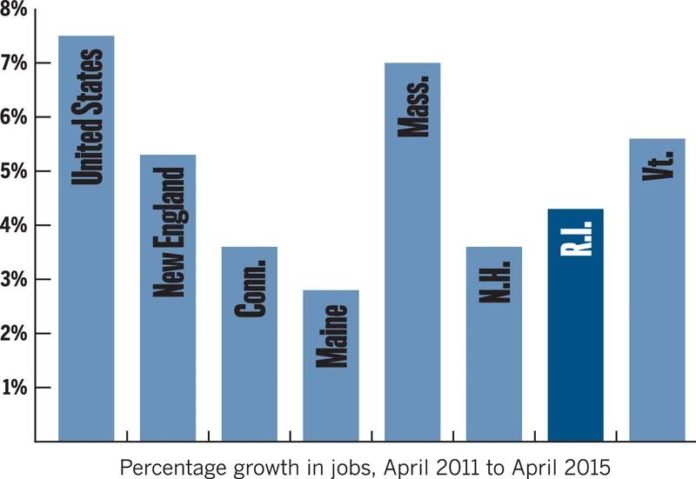
With his entry into the Democratic presidential-nomination sweepstakes, former Gov. Lincoln D. Chafee invites scrutiny of his record as the state’s chief executive.
Instead, he has started his campaign by calling for re-engagement with the world (by among other things, finally adopting the metric system), as well as amnesty for former National Security Agency contractor Edward Snowden. One of his signature moments on the political stage, his vote against the Bush administration’s Iraq invasion, was a highlight of his declaration, which was given during a speech at George Mason University in Virginia.
One thing he did not talk about, however, was his record on the economy. It is a topic he won’t be able to avoid. And while it may be unfair to lay all the blame (or success) on Rhode Island’s governor for the state of its economy, it is certainly a valid subject for discussion.
So how did Chafee do in his four years in office? Going by the seasonally adjusted total of nonfarm jobs in Rhode Island from April 2011 to April 2015 – allowing for the residual effects of a previous administration to be played out, as well as the latest data for Chafee’s policies to have full effect – the candidate did not do as badly as the public perception of his performance.
Rhode Island saw the number of jobs grow from 461,400 to 481,400, a gain of 4.3 percent. That is the third-highest growth rate in New England, behind Massachusetts’ 7 percent gain and Vermont’s 5.6 percent growth. Overall, New England saw growth of 5.3 percent, while the United States saw a gain over the four-year period of 7.5 percent.
One could argue that Rhode Island’s lack of job growth compared to the national numbers is significant, but then, perhaps the issue has more to do with New England than with anything the former governor did or did not do during his time in office. •












